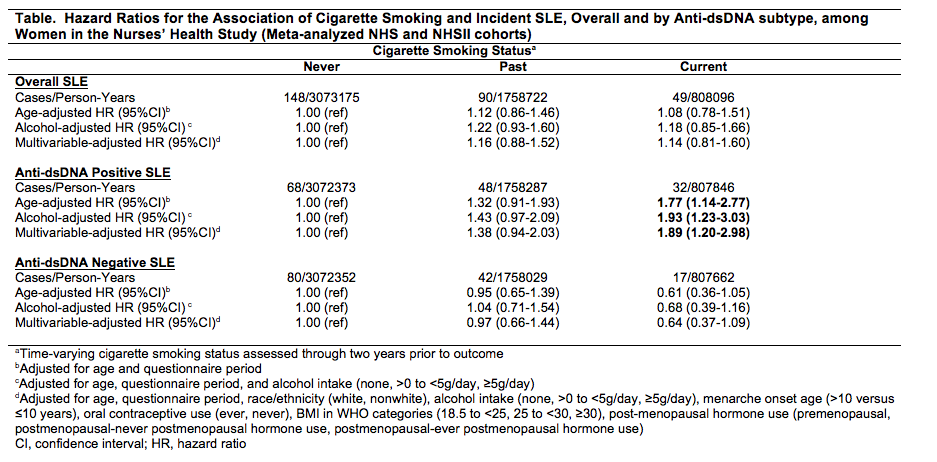Session Information
Date: Tuesday, November 15, 2016
Title: 2016 Rheumatology Research Foundation Edmond L. Dubois, MD Memorial Lectureship
Session Type: ACR Concurrent Abstract Session
Session Time: 2:30PM-4:00PM
Background/Purpose: SLE is heterogeneous with subtypes characterized by different systemic manifestations and autoantibodies. Past studies suggest that smoking may be a risk factor for SLE, although evidence is conflicting and prospective cohort studies have not demonstrated this association to date. Among SLE patients, current smokers have been found to be significantly more likely than never smokers to have anti-double stranded DNA (dsDNA) antibodies. We aimed to prospectively evaluate the association of smoking with risk of incident SLE in a large prospective cohort study, examining risk of the subtypes of dsDNA positive (+) versus negative (-) SLE.
Methods: NHS enrolled 121,701 U.S. female registered nurses in 1976. NHSII began in 1989, enrolling 116,430 female nurses. Lifestyle, environmental exposures and medical history are collected on biennial questionnaires. Incident SLE cases are identified using the connective tissue disease screening questionnaire, followed by medical record review for ACR criteria. Participants without smoking data at baseline were excluded. Time-varying smoking status was assessed categorically (never/past/current). Cumulative smoking in pack-years was also calculated biennially through the 2-year cycle prior to SLE diagnosis. Cox regression models assessed associations of smoking with SLE overall and stratified by dsDNA + or – at diagnosis, controlling for time-varying covariates. Hazard ratios (HR) from the two cohorts were meta-analyzed using DerSimonian and Laird random effects models. As alcohol and smoking behaviors are strongly correlated and alcohol intake is associated with reduced SLE risk, we analyzed age-adjusted, alcohol-adjusted, and multivariable-adjusted models.
Results: 160 incident SLE cases developed in NHS (1978-2012) and 123 in NHSII (1991-2013). Mean age at diagnosis was 53.8 (9.5) yrs in NHS and 43.4 (8.0) yrs in NHSII. In NHS, 33% were current smokers at baseline, and 13.4% were current smokers in NHSII. Among SLE, 46% of NHS and 58% of NHSII were anti-dsDNA+ at diagnosis; 20% in NHS and 11.8% in NHSII had renal involvement at diagnosis. Smoking status or pack-years was not associated with SLE risk overall (Table). However, current (vs. never) smokers had greatly increased risk of dsDNA+ SLE (HR 1.89, 95% CI 1.20-2.98), but not of dsDNA- SLE, after adjustment for potential confounders including alcohol. Women who smoked >10 pack-years (vs. never) had a highly elevated risk of dsDNA+ SLE (HR 1.72, 95%CI 1.16-2.55).
Conclusion: We have uncovered a strong and specific association of smoking (both current smoking and increased pack-years) with risk of dsDNA+ SLE among women. This novel finding suggests a biologic mechanism in dsDNA+ SLE pathogenesis not involved in dsDNA- SLE pathogenesis. 
To cite this abstract in AMA style:
Barbhaiya M, Tedeschi S, Lu B, Malspeis S, Sparks JA, Karlson EW, Costenbader KH. Cigarette Smoking Increases the Risk of Anti-Double-Stranded DNA Positive SLE Among Women in the Nurses’ Health Studies [abstract]. Arthritis Rheumatol. 2016; 68 (suppl 10). https://acrabstracts.org/abstract/cigarette-smoking-increases-the-risk-of-anti-double-stranded-dna-positive-sle-among-women-in-the-nurses-health-studies/. Accessed .« Back to 2016 ACR/ARHP Annual Meeting
ACR Meeting Abstracts - https://acrabstracts.org/abstract/cigarette-smoking-increases-the-risk-of-anti-double-stranded-dna-positive-sle-among-women-in-the-nurses-health-studies/
